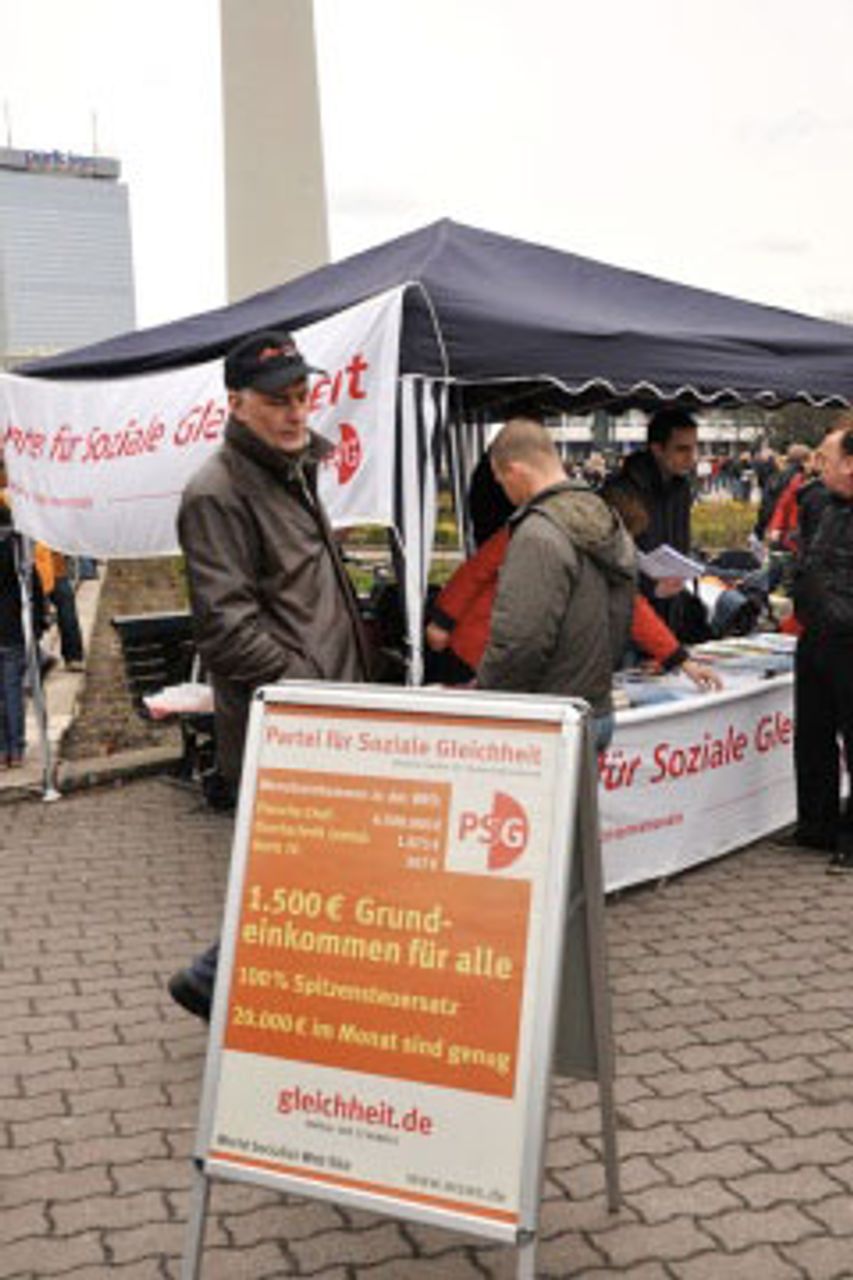 A PSG information table in Berlin
A PSG information table in BerlinThe German Socialist Equality Party (Partei für Soziale Gleichheit, PSG) submitted 4,680 valid support signatures to the German electoral returns officer, thus enabling the party to stand with its own list in the European elections due to take place in June. The party clearly exceeded the legally prescribed minimum of 4,000 officially authenticated signatures to ensure ballot status.
"Although we have only petitioned over a period of four weeks, our campaign to collect signatures developed its own dynamic," said Ludwig Weller, a member of the PSG executive committee. "During this time we were able to make numerous contacts, who in turn assisted in collecting signatures, sometimes bringing along their friends and acquaintances. In addition, we received a considerable response via the Internet. Dozens of readers of the WSWS printed off collection forms, collected signatures in the areas where they live, arranged for their authentication at the appropriate electoral office and sent them on to the PSG."
In the last four weeks members and supporters of the PSG carried out campaigns in city centres, outside labour exchanges and at factories, collecting more than 5,500 signatures and distributing over 10,000 election statements. Each signature had to be given on a separate form and include the complete address and date of birth of those signing. This information must then be examined by the electoral registration offices and confirmed. Only officially confirmed signatures can then be submitted to the federal returning officer.
Some electoral registration offices refused to accept a form on the basis of illegibility of the street name or house number. Signatures of immigrants and young people were also disallowed because they are ineligible to vote in the European elections.
The considerable success of the PSG campaign is directly bound up with the changed political situation. "People know that the crisis is not a temporary phenomenon, but is closely linked to the system of capitalism," Weller declared. "However, none of the established parties tells this truth. Instead, they discuss how they can rescue capitalism."
Workers, unemployed persons and young people responded very positively to the socialist perspective of the PSG. One commented, "People no longer want to hear that capitalism can be reformed. They have experienced just the opposite in past years and decades and this is now especially evident in the crisis."
Weller reported that the campaign won a particularly powerful response in Berlin, the German capital, where broad layers of the population have experienced firsthand the consequences of the anti-social policies carried out by the city's Left Party-Social Democratic Party Senate. This was evident in the meetings called to bring together those assisting in the election campaign in meetings held all over Germany.
Frequently the discussion over building a new party that puts forward an international socialist program was linked to disputes over the role played by the Left Party. In those regions where the Left Party holds power it implements right-wing policies. The party's parliamentary group supports the miserly Hartz IV unemployment payments and merely calls for a slight increase in benefits. The Left Party defends the European Union, and its leader Oskar Lafontaine praised the German government's bank rescue package. Another leading member of the party publicly justified the Israeli terror bombing of Gaza.
Representatives of the PSG made clear that the right-wing positions of the Left Party find their roots in the party's standpoint. Ulrich Rippert, a leading candidate of the party, commented on the Left Party at an election meeting in Berlin, "This organisation is not an instrument of workers aimed at defending their living conditions. It is an initiative of the ruling class aimed at preventing an independent movement of the workers."
The positive response to the first stage of the PSG election campaign is an indication of the broad support that the campaign will win, precipitating discussion on socialist perspectives in opposition to all forms of opportunism and support for capitalism. We call upon all readers of the WSWS to actively support the PSG campaign.
